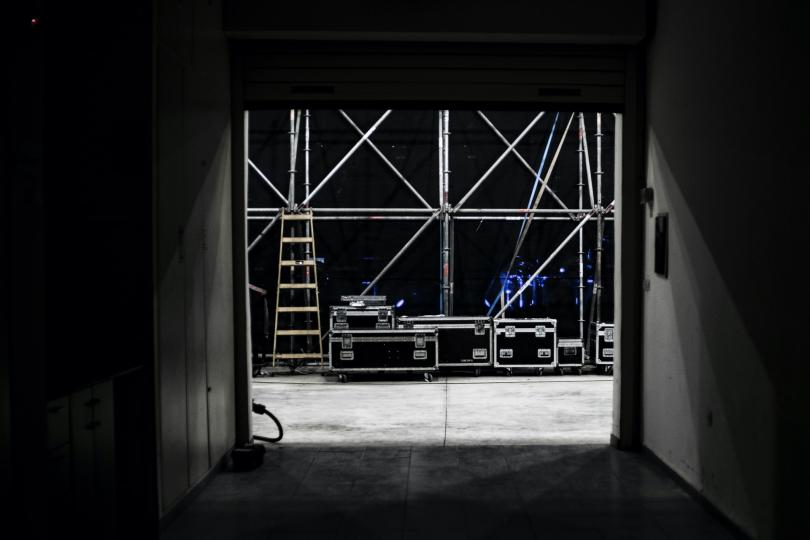Phrases We Should Work to Eliminate in the Rehearsal Room

I co-founded the Black Ensemble Players with my dear friend, Antonio Duke, with the mission of putting Black bodies on stages to tell classical stories. It was vital to foster all-black creative environments that dismantle white supremacist practices in the theater. This need came from the constant stories heard by BIPOC (Black/Indegenous/People of Color) artists working with white majority theatres; stories that consisted of moments where these artists were disrespected, disregarded and diminished by language, practices, and standards that upheld the status quo. I’ve come to realize that while many White led theatres are working towards ways they can be diverse and inclusive, their efforts do not actively dismantle oppressive practices in the theatre. It will take a lot to get there, as many “professional” practices can blur with what can be considered “oppressive” practices. I believe the journey toward dismantling these practices begins with naming it; clearly stating that you are working towards equity, diversity and inclusion as well as dismantling white supremacy and systems of oppression.
Efforts to dismantling systems of oppression can come in many forms: how we view “time,” how we “check our baggage,” or how we pay our artists, but it can also include our language.
We can dismantle oppression in our language as a means of valuing and honoring individuals in the room. There are a plethora of sayings used in rehearsal environments that cause a BIPOC artist to feel powerless and othered in the room; these phrases will not have the same effect on white artists, who have the privilege of doing their work without that added baggage. Not only is the BIPOC artist required to quickly work through that ancestral trauma to be in the moment for the theatrical process but they often feel the pressure to brush it off as a means to save face. They are most likely in an environment where if they even brought that trigger up, they would risk being the “trouble-maker” of the room. They risk being the one who messes up everyone else's groove, ostracized with "sorry looks" for the rest of the production. This feels deeply unfair when what they actually want is to name the aggression or trigger and move on."
This is really hard and can cause the artist to close off and be less available and vulnerable for the work they were hired to do.
With all that being said, I’ve decided to compile a list of sayings that have been heard in the rehearsal room by BIPOC theater artists and offer alternative sayings. Let me be clear that this shouldn’t be my work, this should not be a fun project for me because I feel like. And yet, I am doing this for a few bucks thanks to MNplaylist, and because I have the mental capacity to work through my traumas and teach.
Finally, while I realize there are lots of other sayings that can diminish the existence of many folks, I am writing this article to focus on BIPOC folks. I know that there are many intersections that may not be touched in this short read, but I will do my best to add links and resources so that you can continue to educate yourself on the language you use. #YAWELCOME!
Here We Go Theater Makers of the NOW. Here is a selection of phrases you should work to eliminate in your rehearsal process as they disempower, diminish and devalue BIPOC artists and their important histories. In no particular order. . .
Cracking the whip/Whip em into shape: Whips were used as a form of physical and psychological punishment on enslaved Africans in the Americas. This history has caused their descendents to bear the weight and the work of these generational traumas. Usage of this phrase is not going to get us to work harder, it will remind us of our painful past. (Trigger Warning in the following link(graphic images): https://www.arcgis.com/apps/MapJournal/index.html?appid=d1998315c48a426295b73e44c7ffa562 )
SAY: “getting things in order”
SAY: “get them into shape” or “work them into shape”
Let’s have a PowWow: Pow Wows’ are described “as any gathering of Native people.” And I’m gonna take a guess that people who use this word in an effort to sound hip do not identify as Native or indegenous. Also, your small meeting cannot compare to the significance Pow Wows have to preserve Native cultures and maintain important practices. https://www.nanticokeindians.org/page/what-powwow
SAY: “let’s gather” and “circle up”
Bottom of the Totem Pole (and the like): Totem poles are associated with the belief Totemism which is practiced by Native cultures on the pacififc NW coast. “A totem is an emblem, such as an animal or plant, that is believed to have spiritual significance and watches over the family, clan, or tribe symbolizing their guardian spirit or helper.” Whatever you are associating with the bottom of a totem pole is NOT there. (https://www.warpaths2peacepipes.com/native-american-culture/totem-poles.htm).
SAY: “bottom of the ladder”
Ch*nk in the armor: This is to mean that you are calling something or someone weak. Yet the first word is also a slur against Asian American/Asian people. The slur originated in the early 20th century when Chinese immigration to America was perceived as a threat to the livelihood of White Americans. The traumas associated with this slur are felt by Asian people beyond Chinese ancestry. No matter the context, usage of the word will still have the same impact on Asian identifying people. (P.S: Take it out of your next Midsummer production!) http://nwasianweekly.com/2011/09/racial-slurs-chink/
SAY: Actually, just don’t call someone weak! I just don’t think you should do that. Maybe just talk with a person on where exactly they need to grow.
“No can do” OR “long time no see”: It may seem like you are saving time skipping a few words but the usage of these sayings stem from racial bigotry. People would say these sayings as a means to imitate Native and Asian people in a comical way. I have found many differing origins to these two phrases both online and orally. I encourage you to do your own research to further understand their racial histories.
SAY: “nah” and “ it’s been awhile!”
Off the res: It’s supposed to mean off track and ‘Res’ is short for Native reservations. Native and indegenous peoples were forced to live on reservations, sign bogus treaties and take on the cultures and traditions of White people or else face life and culture threatening consequences. This trauma is not of the past, as we all are still present on the land that belongs to them.
https://indiancountrytoday.com/archive/off-the-reservation-a-teachable-moment-nW1d7U0JRkOszhtg8N1V1A
SAY: “off track” and “on a tangent”
“Hang the blacks”: I know we need to hang the black curtains but this phrase is so packed in the United States. What’s more, the hangings of the past have become the senseless police and white supremist shootings of the present. Saying those three words are reminders of how Black people are and always have been targets.
SAY: “hang the black curtains?” It’s only a one word difference!!
“Slaving away”: I will personally fight anyone who thinks a tech week is “slaving away.” Need I remind you what it took for me to be standing in this very room with you?? Comparing your chorus line dance number or 8 out of 10 work day to what slaves had to endure is not cute at all.
SAY: “working really hard” and “busting our asses!”
“Sold down the river”: This phrase also comes from slave practices. The evils of slavery are not just in whippings, very often families would be broken up due to the chattel selling and trading of human beings. To say this phrase is to mean that you really got Effed over, and I can tell you what 400 years of Effed over feels like.
SAY: “ummmm effed over” or Google something
“Open the Kimono”: SKKKKKKKRRRTTT, now this sounds a little too racist, misogynistic and patriarchal. In the age of #Metoo, is this really a phrase we should be incorporating into our rehearsal room jargon? I know Kimonos are not traditionally associated with one gender but western minds tend to link them to Geishas and women. Let’s not be creepy and racist mmmkay. https://www.npr.org/sections/codeswitch/2014/11/02/360479744/why-corporate-executives-talk-about-opening-their-kimonos
SAY: “dig deeper” and “get more vulnerable”
That’s it for now, but I am sure there are so many more sayings that will take a BIPOC artist out of the moment when they are just trying to do their work. I encourage people to write about all the other sayings and language that further oppresses BIPOC artists in the spaces they should feel safe and creative.
To conclude, this work can begin with changing our language, but it can not and should not end with language. We must uproot supremacy in our theaters by changing practices, ideas and power structures that reinforce business as usual.
I recommend reading “My Grandmother's Hands” by Resmaa Menakem .
Stay tuned for an article about oppressive practices in the theatre!
More resources for you to consider below.
https://www.bustle.com/p/9-phrases-that-spread-mental-health-stigma-what-you-can-say-instead-9002277
https://www.minus18.org.au/articles/how-to-challenge-other-crappy-language-when-you-hear-it
https://mashable.com/2015/10/18/transgender-ally-words/
https://everydayfeminism.com/2015/02/phrases-marginalize-trans-people/
https://www.yesmagazine.org/social-justice/2018/04/12/to-decolonize-our-minds-start-with-words/
http://www.ynpntwincities.org/dismantling_white_supremacy_in_nonprofits_a_starting_point




